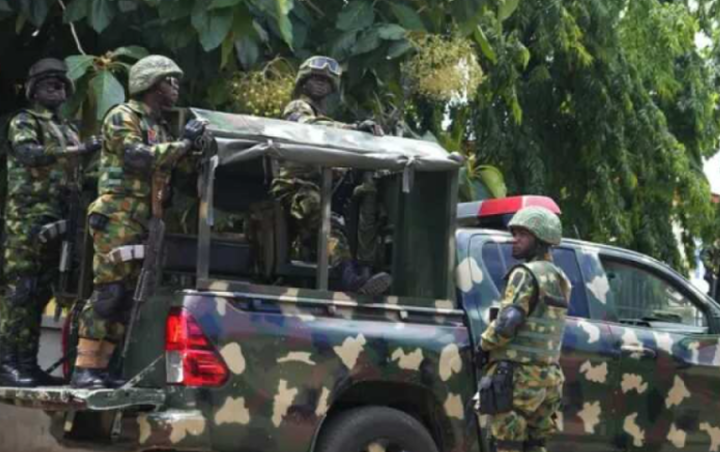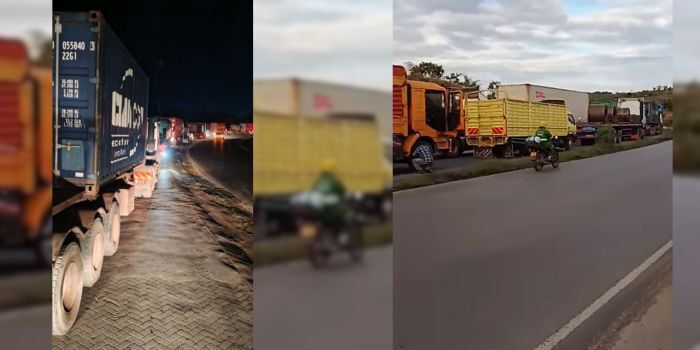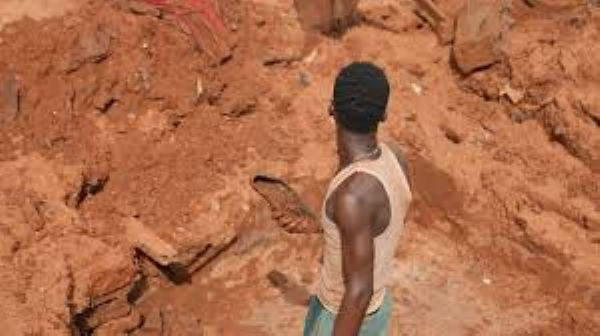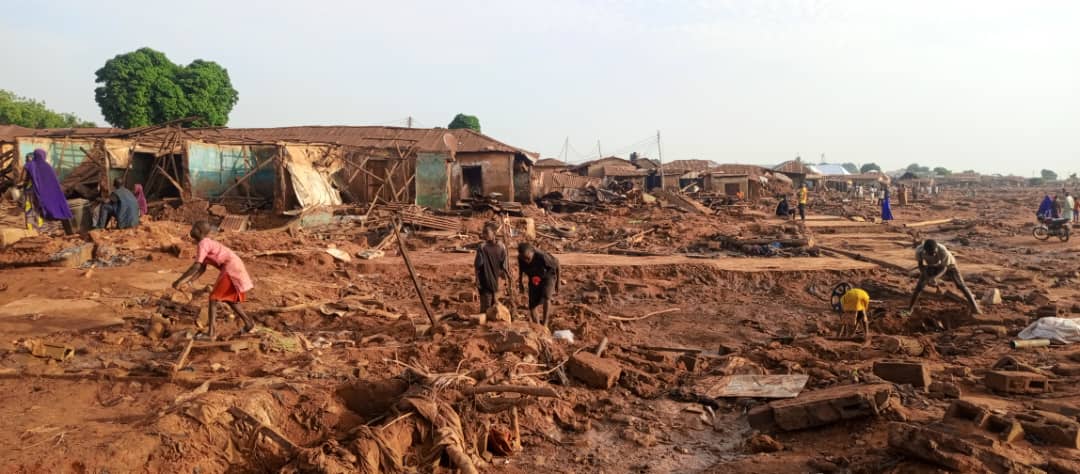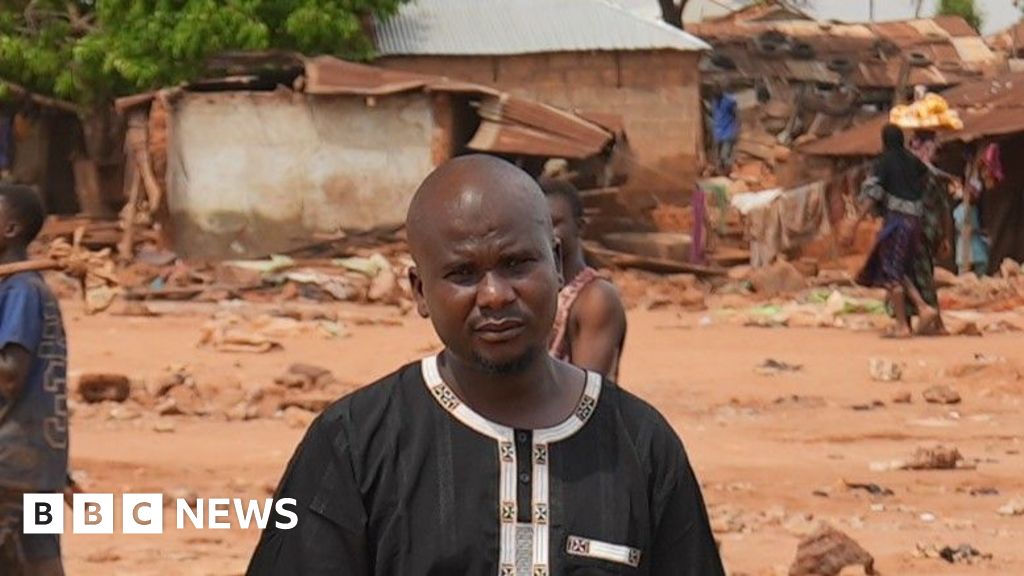Heavy explosions from Giwa Barracks in Maiduguri, the Borno State capital, caused widespread panic among residents in the early hours of Thursday.
The deafening blasts, red flares, and rising smoke forced residents of Polo, Fori, GRA, Unimaid, and other areas into the streets, fearing a possible Boko Haram attack.
Adamu Yusuf, a resident, said the first explosion occurred around midnight, followed by sporadic gunfire that heightened their fears.
“We spoke to a retired soldier who called his colleague in the barracks, confirming a fire outbreak in the armoury. But the gunshots made us second-guess everything,” he said.
Kyari Bulama, who lives close to the barracks, said he was asleep when the gunfire and explosions jolted him awake.
“We all thought it was a Boko Haram attack. We started running helter-skelter inside the house. It was even more terrifying when I went outside. Virtually all the residents were on the streets, and cars and Keke NAPEPs were fleeing the area,” he said.
At the University of Maiduguri, hundreds of students reportedly fled their hostels and moved into town to avoid a potential terrorist attack.
“The explosion was very loud, and it felt like it was getting closer. We rushed out of our hostels, but the security couldn’t tell us what was going on. Eventually, we learned that the military armoury was on fire,” a student explained.
Aisami Lawan, a resident of Polo, said the incident brought back memories of a previous attack.
“It was terrifying. The last time something like this happened was during the Boko Haram attack on the barracks in 2014.
“Alhamdulillah, we haven’t heard of any civilian casualties, but there’s growing fear that the lives of soldiers and detainees in the barracks are at serious risk,” he said.
Excessive heat caused explosion – Army
However, the Nigerian Army confirmed that the explosion was not a terrorist attack but rather a result of high temperatures.
Capt. Reuben Kovangiya, Acting Deputy Director, Army Public Relations, Operation HADIN KAI, said the explosion occurred in one of the ammunition storage facilities due to extreme heat.
“The current high temperatures in Maiduguri caused the detonation of some munitions,” he said.
He added that the situation was quickly brought under control through the combined efforts of the Borno State Fire Service and other emergency responders.
“Troops of Operation HADIN KAI have been deployed to maintain order and prevent miscreants from exploiting the situation,” he said.
Kovangiya urged the public to remain calm and assured that all necessary measures had been taken to ensure safety and prevent future incidents.
Extent of damage unknown
Journalists were denied access to the barracks to assess the damage, and the military has not released further information.
Giwa Barracks is a key military facility in the fight against Boko Haram. It also serves as a detention centre for individuals suspected of having links with the insurgents.
As of July 2023, nearly 2,000 detainees were held there, under investigation for suspected involvement in Boko Haram activities.
According to military records, 2,048 people were detained at the facility as of March 2023. This included 35 women, 10 female children, seven male children, and 1,991 adult males.
The detainees’ cases have reportedly dragged on for years due to various complications.
In early 2024, however, 313 suspects were released by court order.
Police attribute blast to friendly fire, urge calm
The Borno State Police Command has clarified that the recent explosion at Giwa Barracks in Maiduguri was caused by a “friendly fire” incident, not an enemy attack.
The command’s spokesperson, Kenneth Nahum Daso, said preliminary investigations revealed that the explosion originated from the armoury within the barracks.
“Following reports of explosions heard in Maiduguri, preliminary investigations indicate that the detonation originated from a friendly fire incident at the Giwa Barracks armoury.
“No enemy attack has been recorded, and the security situation remains firmly under control,” Daso said.
He added that security forces, Explosive Ordnance Disposal (EOD) experts, and the fire service were currently on the scene working to extinguish the resulting fire.
Meanwhile, the Borno State Government has suggested that the fire outbreak, which led to the explosion, may have been triggered by the extreme heat currently being experienced in the state.
A separate statement from the Directorate of Fire Service, under the Ministry of Information and Internal Security, confirmed that the fire has been brought under control.
“The fire incident affected the ammunition facility within the barracks, and some munitions exploded, causing loud bangs. Preliminary investigation suggests that the intense heat in Maiduguri at this time of year may have triggered the fire,” the statement said.
It also noted that a combined team of first responders from the Nigerian Army Fire Service, the Federal Fire Service, and the Borno State Fire Service had responded promptly and successfully extinguished the fire.
Past attack on Giwa Barracks
On March 14, 2014, hundreds of insurgents reportedly launched a brazen assault on Giwa Barracks in Maiduguri.
The Nigerian military later said the attack was successfully repelled, with many of the attackers killed by both the air force and ground troops.
An eyewitness told Amnesty International that members of the Civilian Joint Task Force (JTF) captured some of the detainees who had escaped during the chaos.
That incident left a lasting impression on many residents, and the recent explosion on Thursday brought back memories of the 2014 attack, reigniting fear in the community.
Experts raise concerns over military capabilities, morale
A security expert, Kabir Adamu, said the incident’s implications go beyond the immediate physical damage and potential casualties.
He said, “The destruction of arms, ammunition, and other essential military hardware within the barracks represents a significant loss of resources.
“This can directly affect the operational readiness of troops involved in Operation Hadin Kai and other security operations in the Northeast and the Lake Chad Basin.”
He noted that logistical supply lines-already strained due to the challenging operating environment-could be further disrupted, making recovery more difficult.
Adamu also warned about the psychological toll on soldiers.
“The explosion undermines their sense of safety and security, especially as they live within the barracks.
“This can lead to decreased morale, heightened anxiety, and a weakened fighting spirit. It could also erode trust in safety protocols and the leadership responsible for enforcing them,” Adamu said.
He further stressed that the temporary disruption caused by the explosion could hamper Operation Hadin Kai until lost equipment and munitions are replaced.
“In terms of counter-terrorism efforts, this incident could be a setback. It may embolden groups such as JAS (Jama’atu Ahlis Sunna Lidda’awati wal-Jihad) and ISWAP (Islamic State West Africa Province) to escalate attacks on both military and civilian targets. They may view the explosion as a sign of vulnerability,” he added.
Adamu also pointed to the risk of eroding public trust, saying “For civilians in Maiduguri, who already live under the constant threat of insurgency, an explosion within a major military facility is deeply unsettling. It may raise fears about overall security and diminish confidence in the military’s ability to protect them-potentially impacting intelligence sharing from the local population.”
Adamu also highlighted the possibility of the explosion being exploited for propaganda.
“Groups like JAS and ISWAP may portray it-regardless of the actual cause-as a successful operation or act of divine intervention, using it to boost recruitment, morale, and to undermine public confidence in the government and security forces.”
“The armed forces must handle the aftermath with transparency and urgency. Strengthening safety protocols and providing clear communication are essential to restore confidence. Failure to do so could strengthen the insurgents’ position and prolong the conflict,” he added.



